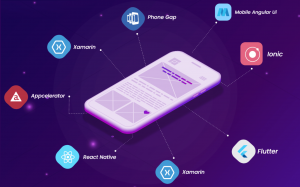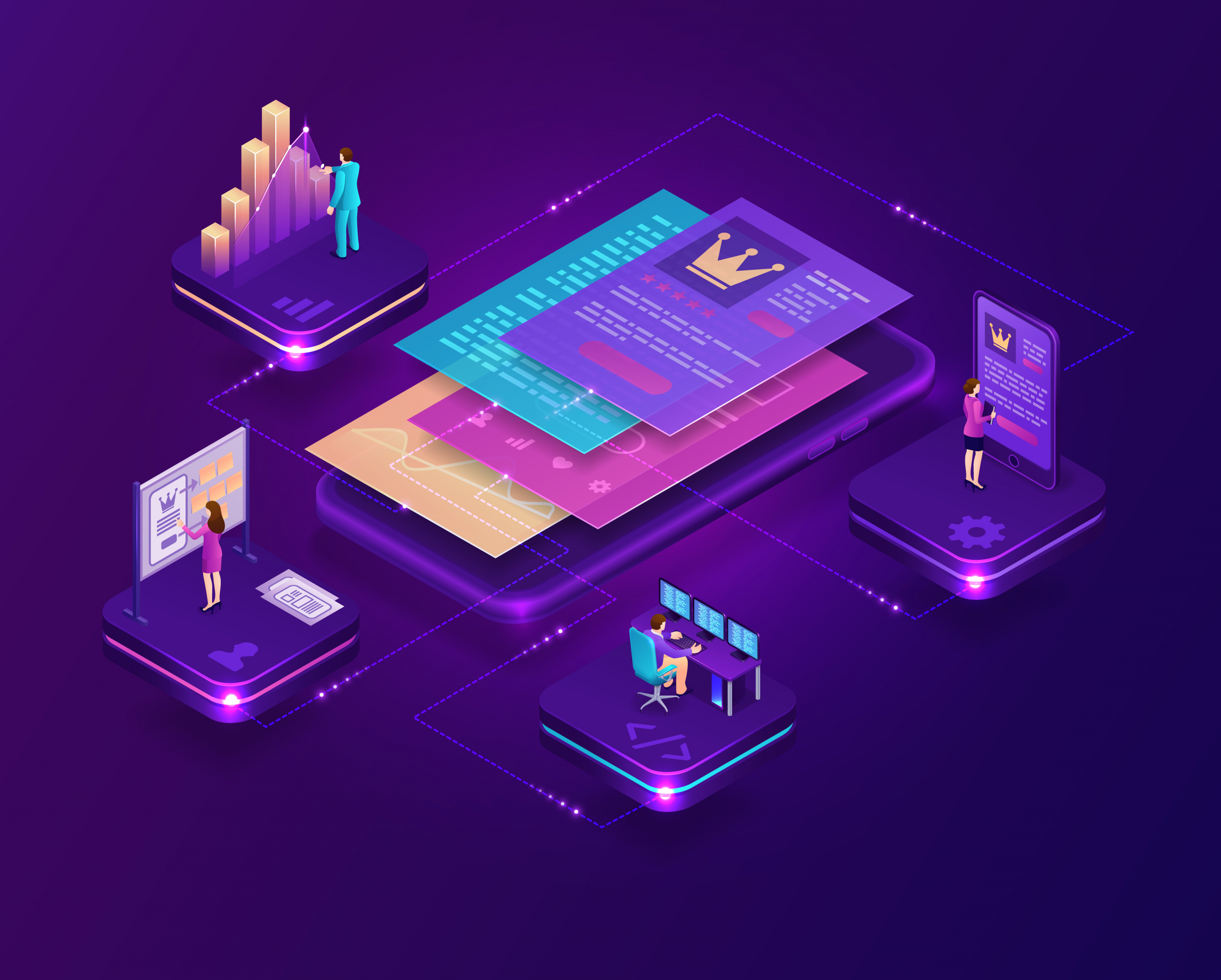You’re right if you think framework sounds like a vague term used to describe almost any technology. The tech community easily applies the framework label to any mixture of development tools.
This blog is for you if you want to understand an app development framework and learn about the best framework for mobile apps. After reading it, you’ll be much more comfortable discussing your digital product with app developers.
Mobile application frameworks are advanced technologies that are becoming increasingly popular worldwide for building apps simply without squandering valuable funds and time on resources. However, everyone wonders how much does a mobile app cost? Well, this is a significant estimation that we will cover in the later part of this blog.
Firstly we will take a look at various frameworks for mobile app development.
The most difficult challenge for any startup is time. It takes time to develop an app and even longer to deliver. More importantly, it necessitates significant upfront and ongoing costs for your development team’s pay for both day and night jobs. This creates a vicious situation: you need developers willing to work at a reasonable rate, and you cannot afford to hire too many developers because it may leave the company bankrupt.
The possible explanation for the exponentially increasing penetration of smartphone application frameworks is the enhanced demand for mobile apps due to the massive audience base on portable devices. Companies are transitioning from a conventional approach to trading to a contemporary, more efficient approach. Major software corporations have now demonstrated that mobile apps are the most effective way to increase their customer base. There is never a shortage of innovative app ideas—everything serves to profit both the customer and the business. To begin with the development, it is better to be fluent in programming languages like HTML, CSS, and JavaScript.
A mobile app framework is a system for creating software that includes techniques, code generators, software, programming interfaces, and other components. The developer’s role is to write the source code for the app and use individual elements to develop an app for various mobile devices.
However, entering the mobile market does not always equate to financial success. To prosper in a highly competitive mobile market system, businesses with an established mobile app or those creating a new mobile app must conduct extensive research, develop a strategy, plan extensively, and evaluate the current mobile ecosystem.
Because of the global shift in human behavior, having a mobile presence has become critical for a company’s survival. As mobility continues to transform industries worldwide, mobile-first companies are capturing the attention of an increasingly mobile society. Even though native apps provide an unrivaled perspective in design and functionality, but they are expensive to build and maintain. With native apps, maximum user infiltration is difficult due to the variety of devices and platforms. The solution is to use mobile app development frameworks to create a web, hybrid, or cross-platform mobile app for businesses with limited budgets.

Modern mobile app development frameworks include numerous built-in benefits, such as a quick development phase, effectiveness, a comprehensive delivery, etc.
Using the services of a reputable mobile app development company or hiring a freelance mobile app developer can allow a business to create smartphone applications that are fast, responsive, and provide outstanding user experiences. Using mobile app development frameworks speeds up and simplifies the business process.
2022’s Best Mobile Development Frameworks
So we’ve learned that there are several paths to take when developing a mobile app:
Creating separate apps for each operating system, developing browser-based apps. Which one are you choosing?
There are cross-platform app creation solutions that can assist bring the third scenario to life with minimal effort. Let’s look closely at the top ten mobile app development frameworks.
Low-level mobile app development frameworks such as React Native and Flutter, pluggable frameworks that facilitate multiple aspects of apps, and no-code/low-code methods of implementation are examples of application development frameworks.
React Native is the most popular framework for developing cross-platform mobile applications. While Flutter is an excellent runner-up.
Many advise using React Native, Flutter, or native technologies when developing mobile apps for Android and iOS, depending on your specific application’s requirements.
Mobile frameworks are used to create (obviously!) mobile applications. Consider ready pieces of code (code libraries), architectural principles, normalized UI components, and developer tools that collaborate with a product’s programming language to create a native mobile application life experience. Cocoa Touch, a prevalent iOS application development structure, has been replaced by SwiftUI, an iOS app development framework from Apple. Jetpack can be used to introduce development best practices, reduce boilerplate, and ensure compatibility problems with earlier versions of Android in an App.
Eventually, some people use the framework label to describe content management systems (CMS), which are widely used to run content-heavy websites. Thus, we believe it occurs even though developers must follow specific rules imposed by CMSs. Furthermore, these solutions are always accompanied by installable plugins that enhance the functionality of websites.
CMSs, for all purposes, are not frameworks, in our opinion. Indeed, if we dig deeper into any CMS, we’ll find that it’s built on a PHP or other programming language-based web framework. When developers suggest building your site with a Drupal structure, they mean implementing and customization of a Drupal CMS instance.
Java has become the most widely used programming language for developing Android apps. It is one of the best choices for developing Android apps because it is based on Android APIs and has many built-in Java libraries. The potential benefits of both Data-Driven and Search term frameworks are combined in the Hybrid Managed Framework. In this situation, the words and the test data are externalized. Test data can be saved in a properties or an Excel file, while keywords are saved in a separate Standard java file.
How to Select the Most Appropriate Framework for Your App
If you’ve read this far, you’re already aware that selecting an iPhone app development framework or an Android mobile app framework entails cautiously evaluating numerous multiple kinds of frameworks’ attributes, ranging from application development expenditures to the type of application you’re building, from medical app development to financial technology application development to chatbot development.
How much does mobile app development cost?
It’s no wonder that almost every entrepreneur wants to bring their enterprise to mobile devices in today’s mobile world. When company owners are looking for a new mobile app, they may be surprised by the initial costs of developing apps. After all, they may believe, “It’s just an app.” “How much could it possibly cost to produce?” Depending on the situation: a lot…or not much.
Many factors determine mobile app development costs, including the development phase, the kind of application, the accessibility of recyclable off-the-shelf components, developers’ experience, app complexity, and so on.
It logically follows that app development has the most significant effect on app cost. Experienced developers who have completed multiple successful projects are still in short supply. As a result, coding an app typically accounts for 50-70 % of the total application development costs; and coding periods differ based on the type of app; from chatbot developing apps to building a marketplace app; or an investment and trading app, working to develop a crypto exchange, or creating a crypto token.
5Star Designers have Experience in Developing Mobile Apps for Android OS and iOS Using Mobile Frameworks (both native and hybrid)
At 5Star Designers, we constantly work on the most suitable development frameworks based on the requirement of app for our client. We use React Native and Flutter to create mobile apps for iPhone (or iPad) and Android smartphones and reuse functionality in the corresponding web applications. The same can be said for our choices in web development frameworks, but that’s a topic for another blog.
We also use a variety of higher-level lightweight frameworks such as Firebase, Core Bluetooth, SwiftUI, PubNub, and others. As a leading mobile app development company, we understand that the achievement of your app today is influenced by the quality of your customer experience, even after consumers have downloaded it. This is why we invariably consider usability and design when developing a mobile application for our clients.



